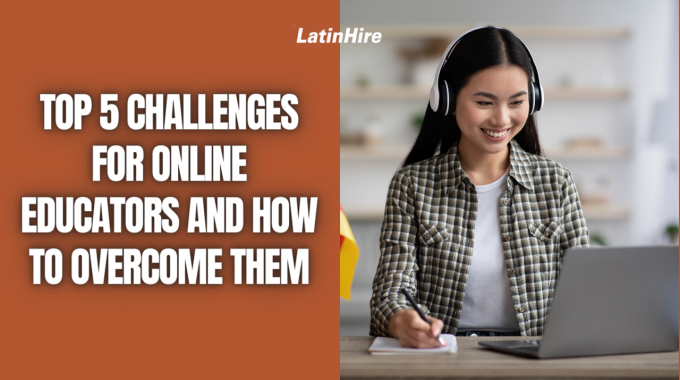Teaching is not just about being in front of a class and imparting knowledge. It…

Top 5 Challenges for Online Educators and How to Overcome Them
In recent years, the landscape of education has transformed significantly, with a surge in online learning platforms and virtual classrooms. Remember the initial panic when COVID-19 took center stage and educators were all forced to move their classes online? Now, with the world slowly recovering from the aftermath of the pandemic, many online teaching opportunities still remain and it’s growing. While this shift has brought about numerous benefits and allowed students to continue their education from home, it has also presented online educators with a unique set of challenges.
In this article, we will explore the top five challenges faced by online educators and discuss effective strategies to overcome them.
Challenge #1: Engagement and Interaction

One of the primary challenges for online educators is maintaining student engagement and fostering meaningful interactions in the virtual environment. Without the physical presence of a traditional classroom, it can be challenging to capture and sustain students’ attention.
Overcoming Strategies:
- Incorporate interactive elements such as polls, quizzes, and discussions within the online platform or through external websites to encourage active participation.
- Foster a sense of community by using breakout rooms and virtual study groups to allow students to connect and have discussions with one another.
- Use multimedia content, including videos, images, and interactive presentations to make the learning experience more engaging.
Challenge #2: Technical Issues
Online education heavily relies on technology, making technical issues a common hurdle for both educators and students. Unstable internet connections, software glitches, or hardware problems can disrupt the flow of a lesson.
Overcome Strategies:
- Conduct a technology orientation at the beginning of the course to familiarize students with the online platform and troubleshoot potential issues.
- Provide alternative resources and communication channels in case of technical difficulties, such as recorded lectures or discussion board participation.
- Have backup devices or alternative access to a reliable internet connection (like phone data), and encourage your students to have the same.
Challenge #3: Time Management

Balancing the workload and managing time effectively can be a significant challenge for online educators. Without a fixed class schedule, it can be difficult to stay organized and to keep track of individual student progress. Work and personal life may blend into one another which can easily lead to burnout.
Overcoming Strategies:
- Use an electronic or paper planner to schedule your classes, so you can visualize your daily teaching hours and assess whether adjustments are needed to enhance your work-life balance.
- Set up alarms as class reminders to reduce the mental burden of remembering your class schedule. This will help you stay punctual and focused on your teaching responsibilities without the constant worry of missing a class.
- Include some breaks between your classes to prevent prolonged periods in front of the screen.
Challenge #4: Sedentary Lifestyle
Unlike traditional classroom settings where teachers walk around the room and interact with different students, online educators find themselves glued to a screen for extended periods of time. This can lead to health issues associated with prolonged sitting.
Overcoming Strategies:
- Invest in ergonomic furniture to promote a healthier posture. Whether it’s ergonomic chairs, standing desks or even balance balls, they can all help mitigate the adverse effects of prolonged sitting.
- Stretch or go for a walk between classes, which not only helps with physical well-being but also enhances mental acuity.
- Stay hydrated to promote overall health and increasing water intake also encourages more frequent trips to the restroom, providing opportunities for movement.
Challenge #5: Inclusivity and Accessibility

Ensuring that online education is accessible to all students, regardless of their background or abilities, is a significant challenge. This includes addressing issues related to digital literacy, language barriers, and catering to diverse learning styles.
Overcoming Strategies:
- Offer resources and support for digital literacy, guiding students on how to navigate online platforms effectively.
- Provide transcripts and captions for multimedia content to enhance accessibility.
- Foster a culture of inclusivity by embracing diverse perspectives and adapting teaching methods to accommodate various learning styles.
What other challenges have you dealt with as an online educator? And what were some strategies you used to overcome them? Share them in the comments below!



